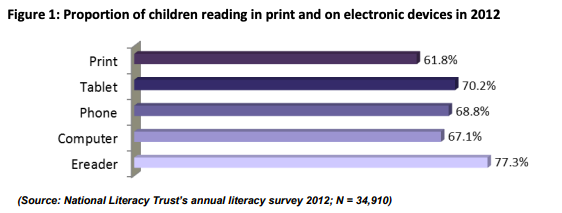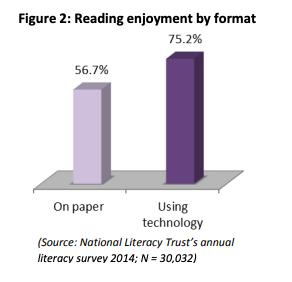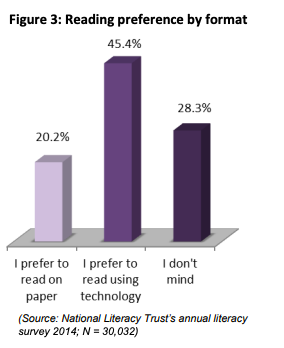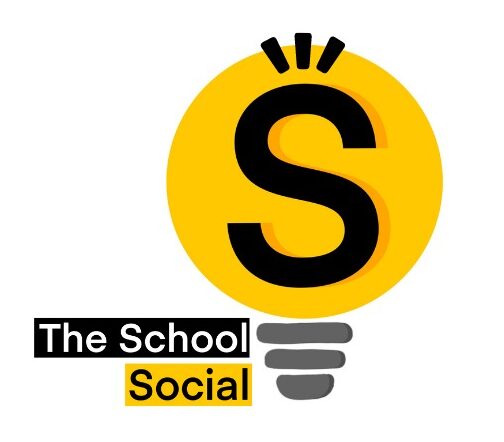
Exposing Kids To Appropriate E-Books/ Digital Content Could Increase The Average Reading Levels By Upto 8.4 Months.
The National Literacy Trust, United Kingdom, conducted a study in 2014/15 to investigate the impact of ebooks and online content on reading within the school environment. The study included a survey with over 30,000 responses from UK pupils aged 8 to 16, providing valuable insights into the preferences and behaviors related to reading on digital devices.
In an increasingly digital world, the way we consume information and engage with content has undergone a significant transformation. Traditional forms of reading, such as reading books on paper, have now expanded to include digital formats like e-books, digital magazines, and online articles.
The study revealed that 75.2% of children enjoyed reading using technology, compared to 56.7% who enjoyed reading on paper. Given a choice, 45.4% preferred reading on digital devices, while 20.2% selected reading on paper.

The study highlights the significance of technology in children’s reading habits and attitudes.
- Increased Digital Reading Frequency
“Nearly twice as many children read daily on devices (42.7%) compared to paper (23.1%). A higher proportion of children read for longer durations on devices, with 32.5% reading for an hour or longer using technology, compared to 20.8% reading for an hour or longer on paper.”
It demonstrates that digital content, including ebooks, digital magazines, websites, and social media, plays a vital role in promoting reading enjoyment and increasing reading frequency. While traditional paper-based reading remains prevalent, the findings emphasize the need for schools to explore the potential of digital libraries to support literacy and learning. - Enhanced Reading Motivation
The study found that more participants felt motivated to read when presented with digital content options. The ability to adjust text size, access instant online dictionaries, and engage with interactive features were cited as factors contributing to increased motivation.
- Increased Reading Enjoyment
Engaging with digital content resulted in a significant increase in reading enjoyment. Participants reported finding reading “cool” and expressed greater anticipation for reading time in class. This positive shift in attitude indicates that digital content can enhance the reading experience.
- Expanded Reading Choices
“ The percentage of pupils who found it difficult to find things to read that interested them decreased by 37%, from 31.3% to 19.7%.”
Digital content expanded the range of reading choices available to participants. Access to a variety of online resources and e-books provided a wealth of reading materials that may not be readily available in traditional formats. This increased choice contributed to a higher overall reading engagement. - Impact on Reading Skills
“The number of pupils who perceived reading as difficult halved from 14.8% to 6.8%.”
The study found a direct correlation between the extent of digital content usage and reading progress. Pupils who used digital content platforms more frequently experienced greater progress in their reading abilities.
Supporting Reluctant Readers through Ebooks and Digital Content
In today’s digital age, technology has become an integral part of our lives, including the way we read. E-books, in particular, have gained popularity as a convenient and accessible format for reading. They offer a range of benefits, especially in educational settings, where they can support less keen readers.
Ebooks proved to be a valuable resource for engaging less confident readers, as they found the digital format more appealing and accessible. The ability to adjust text size, utilize dictionaries, and access books on various devices made reading a more comfortable and enjoyable experience for these students.
In the study, schools observed that ebooks played a significant role in engaging children with reading by offering a wide range of book choices. By allowing kids to select books based on their preferences and interests, schools saw increased participation and enthusiasm, especially among female students.
For schools without a physical library, e-books have emerged as a valuable resource. Let us look at the key findings of a success story from the study of a high school that leveraged the eBooks platform to establish a virtual library and the positive impact it had on students’ reading abilities and overall academic growth.
The results were encouraging, with increased independent reading, higher engagement, and significant progress in reading ages.
- Ebooks helped to empower students through technology
Years 7 and 8 students were equipped with iBook minis, which became instrumental in their reading journey. Recognizing that poor reading skills can lead to difficulties in various subjects, the school set out to empower students by fostering a love for reading.
- Ease of Access and Personal Choice
To encourage independent reading, the school implemented a library book request system that allowed students to make their own choices.
- Measurable Progress and Increased Engagement
Notably, several students demonstrated significant improvements in their reading ages over just a few months. For instance, in Year 8, 4 pupils increased their reading ages by 11 months. In Year 7, one student made an astonishing leap of 2 years and 10 months.
Students were empowered to explore a vast collection of books, improve their reading abilities, and develop a lifelong love for reading. The integration of technology into education continues to shape the way we learn, and eBooks have emerged as an invaluable resource that bridges the gap between traditional libraries and the digital age.
E-books have also proven instrumental in promoting family reading experiences. A primary school organized a Reading Cafe where parents and children could share reading time together. By using tablets and smartphones to access the digital reading material, families could read and discuss e-books both at home and during the Reading Cafe sessions. Parents reported that e-books made reading more enjoyable for their children, boosting reading confidence.
We always practise reading
an ebook at home the night
before Reading Cafe. The
extra reading on screen is
good because it means
there is just more reading
happening. My daughter’s
reading confidence has
increased.
The impact of e-books and online content on reading habits and enjoyment cannot be underestimated. As demonstrated by the findings and statistics from various studies, e-books have successfully engaged reluctant readers, increased reading choice, supported disadvantaged students, created virtual libraries, and fostered family reading experiences.
By harnessing the power of technology, educators and parents can empower students, bridge achievement gaps, and cultivate a lifelong love for literature. The future of reading is undoubtedly digital. Not only does digital reading content offer accessibility and portability, but it also provides interactive and personalized features that enhance comprehension and engagement. Moreover, digital platforms promote a sense of community and enable social interactions around reading. As we continue to embrace digital technologies, it is crucial to leverage their potential to foster a lifelong love for reading and promote literacy among children and young people.
Transforming the way young children use digital devices, The School Social, brings a whole range of fun and exciting content online which makes children love reading. The platform is not only highly secure for young users, but also gives them a free space to be themselves.
Check out more here.
